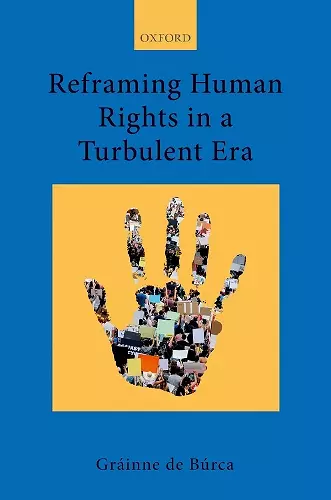Reframing Human Rights in a Turbulent Era
Format:Hardback
Publisher:Oxford University Press
Published:9th Mar '21
Should be back in stock very soon
This hardback is available in another edition too:
- Paperback£44.99(9780199246007)

In recent years, human rights have come under fire, with the rise of political illiberalism and the coming to power of populist authoritarian leaders in many parts of the world who contest and dismiss the idea of human rights. More surprisingly, scholars and public intellectuals, from both the progressive and the conservative side of the political spectrum, have also been deeply critical, dismissing human rights as flawed, inadequate, hegemonic, or overreaching. While acknowledging some of the shortcomings, this book presents an experimentalist account of international human rights law and practice and argues that the human rights movement remains a powerful and appealing one with widespread traction in many parts of the globe. Using three case studies to illuminate the importance and vibrancy of the movement around the world, the book argues that its potency and legitimacy rest on three main pillars: First, it is based on a deeply-rooted and widely appealing moral discourse that integrates the three universal values of human dignity, human welfare, and human freedom. Second, these values and their elaboration in international legal instruments have gained widespread - even if thin - agreement among states worldwide. Third, human rights law and practice is highly dynamic, with human rights being activated, shaped, and given meaning and impact through the on-going mobilization of affected individuals and groups, and through their iterative engagement with multiple domestic and international institutions and processes. The book offers an account of how the human rights movement has helped to promote human rights and positive social change, and argues that the challenges of the current era provide good reasons to reform, innovate, and strengthen that movement, rather than to abandon it or to herald its demise.
In this refreshing and inspirational book, Gráinne de Búrca directly confronts human rights sceptics among scholars from across the political spectrum to demonstrate that, in practice, human rights have maintained an extraordinary vigour in motivating and supporting grassroots mobilization against political repression and illiberalism. With her well-known skill in developing powerful and innovative arguments, she builds on the actual practice of human rights activists to illuminate the dynamism of the human rights project, activated and shaped through both its moral appeal, and the meaning and impact given to it by affected groups. * Sandra Fredman, Professor of Law, Oxford University *
At last a book that makes the case for human rights and does it with great weight and authority. Gráinne de Búrca is proud to believe in human rights and supplies powerful reasons for our doing so too. Fresh and scholarly, de Búrcas account is a bracing change from the negativity that too often infuses academic treatments of the field. * Conor Gearty, Professor of Human Rights Law, LSE *
This book comes at the right time in a world that looks too grim. Grainne de Búrca provides grounded empirical assessments of the work that human rights movements do through structuring modes of interacting across national boundaries. De Búrca offers a nuanced appreciation of a complex world full of "mixed and partial" achievements, often met with backlash. De Búrca demonstrates that, when politics permits, the processes of ratifying, reporting, and arguing about what human rights commitments mean can engender new opportunities to lessen (not erase) modes of subordination. * Judith Resnik, Arthur Liman Professor of Law, Yale Law School *
Finally we have a thoughtful book about human rights which captures the vibrancy and successes of the diverse human rights movement. Anyone who wants to understand the real rather than the imagined world of human rights should read de Búrca's study. She makes it clear that struggles for social justice will continue to coalesce around the language of human rights for a long time to come. * Andrew Clapham, Professor of International Law, Graduate Institute of International and Development Studies *
ISBN: 9780198299578
Dimensions: 241mm x 165mm x 19mm
Weight: 552g
256 pages